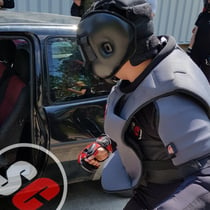
Mistakes are human, but each one of us considers mistakes or wrong executions in training as unpleasant. Mistakes reveal our deficits and limitations and we perceive this failure as a weakness within our own performance. But instead of justifying one's own mistakes or even assuming the role of an accused person and defending oneself against the trainers or other people, one should learn to recognize the positive effects of mistakes and thus grow consistently. Each of us is not error-free in everyday life. We constantly make mistakes, different in intensity and impact. In training, on the other hand, many trainers try to avoid mistakes, not to attract attention and also to avoid correction by a trainer. But who acts in such a way, often unknowingly renounces the conversion of new possibilities and also on the own progression within the conversion of techniques, drills, etc.. - one stagnates.
Stagnation leads to boredom, frustration and failure.
We must learn from our mistakes and grow. If you allow mistakes to occur during training, or if you allow yourself to make mistakes, these offer a very high-quality opportunity to increase your own performance. In self-protection training, in shooting training or in Medic training, mistakes are the order of the day. Exercises are often designed in such a way that the trainee is led to the limits of his performance, leaves the so-called comfort zone, and has to make new decisions in the arriving learning zone. Possible mistakes are used as a training instrument. A mistake can always have a strong influence on the further course of the exercise. Depending on the severity of the error and the individual competencies, this can lead to complete stagnation or at best be compensated by other actions. If a misconduct is defined here as a non-fulfilment of a requirement, a well thought-out exercise structure offers the possibility of correcting this mistake by other actions during the course of the exercise or to show a positive learning process in the follow-up, in which individual solution possibilities are presented and these options are worked on together with the trainee.
Errors remain errors and must be handled in the same way.
If you make a wrong decision in scenario training with a serious outcome or if you are made in force-on-force training by a colour marking projectile due to incorrect clarification of the room, these errors must also be communicated clearly. Here it is the trainer's task to describe the perceived error objectively and not to hold it against the trainee. The trainee must also accept the error correction - so-called openness to errors. Again and again it has to be stated that the trainee, due to a false acceptance of his own mistakes or a scratched ego, tries to make these speeches and even in the following video evidence doubt what he has seen or does not want to acknowledge it as the action he has actually performed.
Mistakes should be made in training.
A large part of our training design is based on the idea that trainers make mistakes and can thus work constructively on possible deficits in implementation and promote development. In the training progression one can speak also of positive mistakes, since these mean a progress and learning process. However, this also presupposes that a clearly defined goal is set in the area of professional training design that the trainees should achieve through their training. This is the only way to recognize and correct individual performance weaknesses. A professional training design also means that the trainer analyses the mistakes of the trainees and draws possible conclusions for the future training design.
We should learn from mistakes - all of us!
